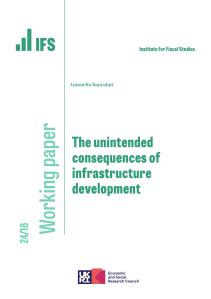The next government is likely to face some of the most difficult economic and fiscal choices the UK has faced outside of pandemics, conflicts and financial crises. These challenges are entirely predictable. Those seeking our votes should level with the electorate about how they will confront them.
A combination of high debt interest payments and low expected growth is forecast to make it more difficult to reduce debt as a fraction of national income than in any parliament since at least the 1950s. Doing so – as both main parties have committed under their fiscal rules – looks set to require substantial primary surpluses: that is, to get debt down, government will need to raise more in tax and other revenues than it spends on everything other than debt interest. The country has not achieved that for more than 20 years.
A new government will inherit taxes at record levels for the UK (though still low-to-middling by European standards); living standards that have endured a record-long stagnation; and public services – health, local government, prisons, the justice system – that are visibly struggling, and performing less well than they were back in 2010. Yet current spending plans imply further cuts for most public services other than health.
The parties must be honest with the public about the tough trade-offs they will inevitably have to make on tax and spending. These are among the findings of a new report from IFS. Kicking off IFS’s programme of general election work, funded by the abrdn Financial Fairness Trust and the Nuffield Foundation, IFS director Paul Johnson said:
‘Now more than ever, as a country, we face some big decisions and trade-offs over what we want the state to do and how we’re going to pay for it. Those looking to form the next government should be honest about these trade-offs. If they are promising tax cuts, let’s hear where the spending cuts will fall. If they are going to raise, or even protect, spending, they should tell us where taxes will rise. Or parties might think that further increases in government debt are justified: in which case they should make the argument for why debt should be rising.
‘If to govern is to choose, then to campaign should be to present clear choices and trade-offs to the electorate. If the parties don’t do that clearly and honestly over the next year, we at IFS will do what we can to plug that gap.’
Everything is harder when the economy is growing slowly, when the public finances are constrained by elevated debt and debt interest spending, when taxes have already been increased sharply, and when many public services are struggling. The report gives details of some of the difficult trade-offs, which will include:
- Current government plans are for public investment to fall by 0.8% of GDP, or more than £20 billion, by 2028–29. Hence, even under Labour plans to increase ‘green investment’ by an additional £20 billion a year, total public investment would still be lower in real terms at the end of the next parliament than it is today. This is, ultimately, a question of priorities: more investment means less consumption now, while less investment likely lowers future prosperity. Of course, Labour’s commitment to green investment is itself a huge statement of priorities relative to all the other potential calls on investment budgets and on the wider public purse.
- A tight funding environment will make it more difficult to rebalance public service spending. If no extra money is available, you cannot increase spending on preventative services, for example, without making cuts elsewhere. Desperately needed rationalisation of local government finance is much harder. It will also be harder to pursue desperately needed tax reform without creating losers. After 15 years of stagnating living standards, nobody will be keen on that.
- We spend £153 billion a year on benefits for pensioners and £124 billion on benefits for children and people of working age. For politicians looking to cut taxes or increase spending elsewhere, this can look like a tempting place to go in search of savings. But the generosity of many benefits has already been cut, and to do more could cause more serious hardship. Spending on disability benefits is rising incredibly fast as claimant numbers soar. This needs urgent attention, but previous efforts to rein in spending have struggled to achieve their objectives. Again, any general promises to cut spending should be accompanied by specific details as to who would lose out.
- Net immigration is at record levels, and both major parties have pledged to bring it down. But neither party has promised the additional support to the social care system that would almost certainly be required if numbers of foreign care workers were to be cut substantially. And neither has proposed higher fees for domestic students to make up for any loss of foreign students, on whom the sector is very dependent.
- The UK has made good progress towards its net zero target and much better progress than many other high-income countries. But we are running out of low-hanging fruit. The next stage of the transition, especially reducing emissions from the heating of residential and commercial buildings, will mean pursuing policies that impose explicit – and potentially highly salient – short-term costs on households and businesses. This may well be a price worth paying, but it will not be pain free.
Mubin Haq, Chief Executive of abrdn Financial Fairness Trust, said:
‘With the next election imminent, there’s a danger that politicians paint themselves into a corner by failing to confront difficult trade-offs. They therefore risk being unable to fund existing public services or invest in new provision to kickstart our ailing economy. Fiscal constraints make these commitments tricky but not impossible. With the public firmly behind the need for greater investment, it should be possible to be honest about the need to increase revenues to pay for it. Failure to do so risks our living standards continuing to stagnate.’
Mark Franks, Director of Welfare at the Nuffield Foundation, said:
‘Given the daunting economic and fiscal outlook, the next government will rightly look to improve the growth of the economy to make the difficult trade-offs it faces less acute. But, even if growth surpasses expectations, the government will still have to grapple with very difficult economic and fiscal choices. Additionally, recent years have underscored the ever-present threat of adverse economic shocks, which would make the trade-offs even more stark. Cutting investment spending would only worsen this economic bind in the long term.’












